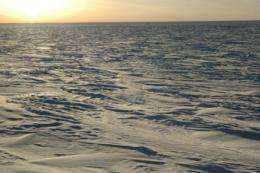Snow could offset global warming in Antarctica

Increased snowfall in Antarctica could offset the future impact of global warming on the continent, according to research carried out by a French team comprising researchers from the Laboratoire de Glaciologie et Géophysique de l'Environnement and the Takuvik International Joint Unit. The research reveals the existence of a hitherto underestimated negative feedback mechanism acting on temperatures. Using satellite images and numerical modeling, the researchers showed that rising temperatures in Antarctica will lead to increased precipitation and, therefore, to a 'whiter' snow that will reduce the impact of climate change at the heart of the continent. The study, published in the 1 July 2012 issue of the journal Nature Climate Change, should help to take better account of snow in models used to predict global climate change.
The amount of solar energy absorbed by the surface of the Antarctic continent is determined by the snow's albedo, in other words by its 'whiteness'. The albedo, in turn, depends on the size of the snow grains. In a process that is familiar to physicists, once the fine particles of snow are deposited on the surface they tend to become larger, at a rate that increases with temperature. The coarsening of the grains leads to a fall in albedo, which causes temperatures to rise. Climatologists have long been aware of the importance of this positive feedback mechanism.

However, according to recent experiments by researchers at the Laboratoire de Glaciologie et Géophysique de l'Environnement and the Takuvik International Joint Unit, this effect is partially offset by a hitherto underestimated negative feedback mechanism. Using data from satellites observing the Antarctic surface at microwave wavelengths, the scientists showed that, in summers marked by heavy snowfall, albedo did not change significantly: the surface was covered with fine snow grains that were constantly renewed. Snowfall is expected to increase in Antarctica in the future and it is well known that, when temperatures are very low, the air is dry and snowfall is scarce. In Antarctica therefore, warming will also result in increased precipitation.
According to the researchers, in a climate scenario where the temperature of Antarctica rises by 3°C, heavier snowfall would increase the albedo by 0.4%. This would offset the 0.3% fall in albedo caused by the rising temperatures (positive feedback loop). Thus, despite significant warming in Antarctica, albedo will vary only very slightly over a large part of the continent. Since the positive temperature-albedo feedback loop will not be established, warming in Antarctica will be lower than expected. Warming predictions should be revised downwards by 0.5°C for central Antarctica. This research highlights the need to take better account of snow in models used to predict future climate change.
More information: Inhibition of the positive snow-albedo feedback by precipitation in interior Antarctica. G. Picard, F. Domine, G. Krinner, L. Arnaud and E. Lefebvre. Nature climate change. 1 July 2012.
Journal information: Nature Climate Change
Provided by CNRS



















